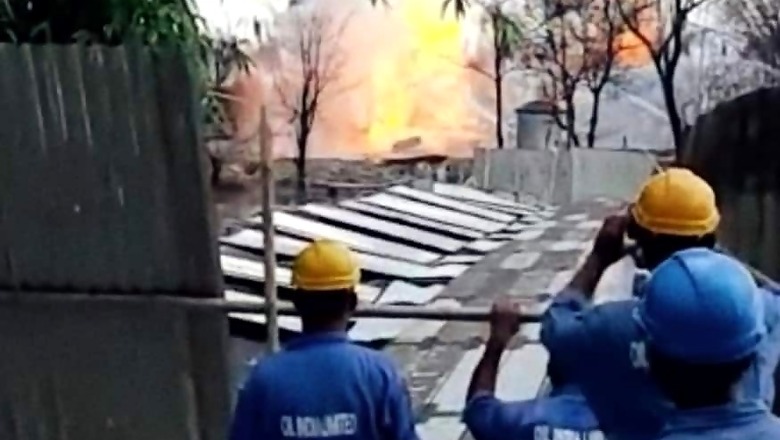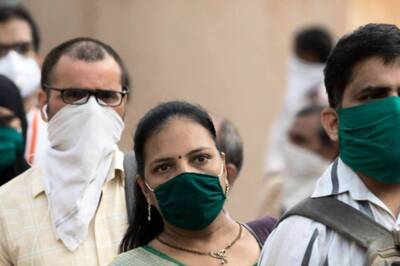
views
Three foreign experts were injured on Wednesday in an accident that occurred near Oil India Limited (OIL)'s gas well in eastern Assam’s Baghjan. While trying to control the raging inferno at the blowout natural gas well, the experts sustained minor injuries when they were removing a spool.
Six experts of the Singapore-based firm Alert Disaster Control have been engaged in crucial operations of capping the well and controlling the wellhead flames since July 9. They were specially flown in more than a month ago to control the disaster.
"It was not a blast but a work-related accident. They use a lot of water blanket cover during such operations that helps to work despite the well being on fire. Today, while working at the lower portion, the fire suddenly took a lateral turn instead of a vertical direction," said OIL spokesperson Tridib Hazarika.
"Three experts received minor injures during the fag-end of the critical operation to remove a damaged spool though the task was successfully accomplished. They are absolutely fine and have been released from hospital. Our operations will resume tomorrow morning," Hazarika added.
The experts from US and Canada identified as Doug Dallas, Anthony Steven Reynolds and Craig Neil Duncan were rushed to the nearby private nursing home and then shifted to the Duliajan OIL hospital. Sources said Dallas was slightly more injured in the right hand than the other two.
"The next task would be to reinstall the blowout preventer (BOP) on the remaining spool, which might take a day or more time than expected," said the OIL Spokesperson.
The foreign experts are working alongside experts from the Oil and Natural Gas Corporation (ONGC) and other agencies. OIL has been dishing out more than Rs 30 lakh per day on the six foreign experts. Tinsukia district police and Indian Army personnel are also helping authorities by manning the ‘Red Zone’.
On June 10, two firefighters of Oil India Limited lost their lives battling flames that caused extensive damage to the peripheral villages, affecting people, marine life and wildlife near the installation. The uncontrollable blowout was reported at Baghjan Well No. 5 on May 27 after pressure control systems failed during Workover operations to produce gas from a new sand (oil-and-gas bearing) reservoir at a depth of 3,729 metres. While the periphery fire resulting from the gas and condensate spread over 500-600 metres was fully controlled within 24 hours since it broke out nearly a fortnight ago, the well fire was restricted within the site. Authorities have since been trying to contain the uncontrolled escape of gas from the wellhead that would also finally lead to extinguishing the flames. Thereafter, the well-killing operations would be initiated.
OIL authorities, had earlier, said that the final operation of capping the well would take about four weeks. However, there has been a delay of 8-10 days because of protests and blockades staged by locals since the beginning of June, officials said. On Wednesday morning, the authorities had to face resistance from villagers who blocked the approach road to the site hampering movement of crew.
Over 2,500 people from 1,610 families were accommodated in 12 relief camps run by OIL with the help of district administration. A one-time compensation of Rs 30,000 was also provided to each family as immediate relief. To meet the key demand of protesters and pay adequate compensation, the district administration has undertaken a survey to assess the consequences of the blowout in Tinsukia and Doomdooma towns.
Meanwhile, protests by villagers at drilling and Workover locations has severely impacted oil and natural gas production - operations have been disrupted in 13 OIL wells and 5 gas wells in the vicinity of the blazing blowout well. There has been a production loss of 15247 MT of crude oil and 33.73 MMSCM of natural gas in past 55 days owing to ‘bandhs and blockades’.
Earlier, an environmental impact assessment was done prior to the capping of the well, and another study is set to be completed at the end of operations. A recording is also being done for seismological study near the gas well site while a team from The Energy and Research Institute (TERI) has started sample collection for air quality and noise level management. The National Green Tribunal (NGT) has also formed a committee of eight experts to assess the damage caused to locals and the ecosystem from the blowout.


















Comments
0 comment